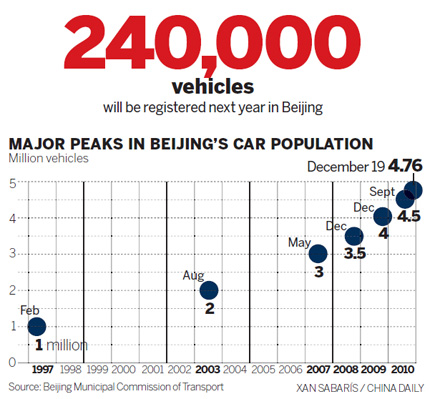Cars
Beijing unveils measures to ease traffic flow
By Chen Xin (China Daily)
Updated: 2010-12-24 14:19
 |
Large Medium Small |

The city will also prohibit new government cars for the next five years and limit car usage on the basis of odd and even last license plate numbers. Car limits will also be imposed during bad weather, key festivals and when important activities are held.
In order to ease traffic congestion, the measures also adjusted parking fee rates which will take effect from April 1.
Parking fees inside the Fifth Ring Road will be charged for every 15 minutes rather than 30 and will range from 2 yuan to 10 yuan per hour.
Cars registered outside of Beijing will be banned from inside the Fifth Ring Road on work-day rush hours, from 7 to 9 am and 5 to 8 pm.
Zhou said Beijing will also charge congestion fees "at the appropriate time".
"As long as you make the purchase before midnight, you can get around the license limit," a salesman surnamed Wang with a Honda 4S store in Fengtai district told customers in the evening.
"I think these measures will achieve the desired effect to curb traffic congestion. By limiting car license plates, people will be encouraged to take public transport," said Duan Liren, a professor specializing in transportation at Chang'an University.
If car purchase is left uncontrolled, the whole transport system in Beijing may soon collapse, he warned.
In addition, Beijing vowed to enhance traffic infrastructure and set a target of public transport accounting for 50 percent of city travel in 2015.
"Among all the measures, the priority should be given to public transport," said Zhang Changqing, director of the transportation law institute at Beijing Jiaotong University.
"Experiences from other countries suggest that smoother and more convenient public transport will make more people turn to it and in turn help improve the whole traffic situation," he said.



